8. Paris, Texas (Wim Wenders, 1984)

Winner of the Palm d’Or at the 1984 Cannes Film Festival, the FIPRESCI Prize, and the Prize of the Ecumenical Jury, Paris, Texas depicts the life of man who is unable recover from love loss. Wim Wenders explores the damage that can be done to a person at the hands of a loved one.
Travis Henderson (Harry Dean Stanton) walks across the Mojavi Desert in a melancholic daze. He has been missing for 4 years, ever since his wife left him. Badly dehydrated, Travis enters a saloon where he then collapses. He is found and treated by a doctor.
The Doctor then contacts Travis’ brother Walt, who believed Travis had died years ago. After learning that his wife Jane (Natasha Kinski) is now living in Houston, Travis embarks on a journey to find her.
Paris, Texas challenges the ideas of love as static and inherently good. Travis and his wife were once inseparable, but the dissolution of their relationship left him so broken that he went missing for 4 years, wondering aimlessly. Travis and Jane are never really able to rectify their relationship, and Travis will never be the same because of it.
7. Before Midnight (Richard Linklater, 2013)

The third installment of a trilogy chronicling the development of an intimate relationship between two strangers who meet on a train, Before Midnight challenges the idea of certainty in regards to romantic relationships. Richard Linklater portrays romantic love as filled with doubt, revealing the fear, regret, and self-sacrifice inherent in such a commitment.
Nine years after the events of Before Sunset, Jesse (Ethan Hawk) and Celine (Julie Delpy) have become romantic partners and parents to two girls.
In the process of a messy divorce from his first wife, Jesse struggles to maintain his relationship with his son Hank. While on vacation with Celine and their girls, Jesse ponders a way that he could play a bigger role in Hanks life. Meanwhile Celine expresses her anxiety and excitement about a new job opportunity working for the French government.
Richard Linklater confronts the audience with the fact that there is no certainty with regards to romantic love. We cannot be sure of our feelings, are choices, and our ability to maintain our commitment. Both Jesse and Celine have sacrificed a lot for their relationship. Jesse has lost a wife and his relationship with his son.
Celine has lost her independence and freedom. Neither of them is sure how much more they are willing to sacrifice. Maintaining a romantic relationship takes work. We cannot be certain that the gains are worth the loss, and we do not know what we are willing to do for love until it is time to act.
6. The Bitter Tears of Petra Von Kant (Rainer Werner Fassbinder, 1972)
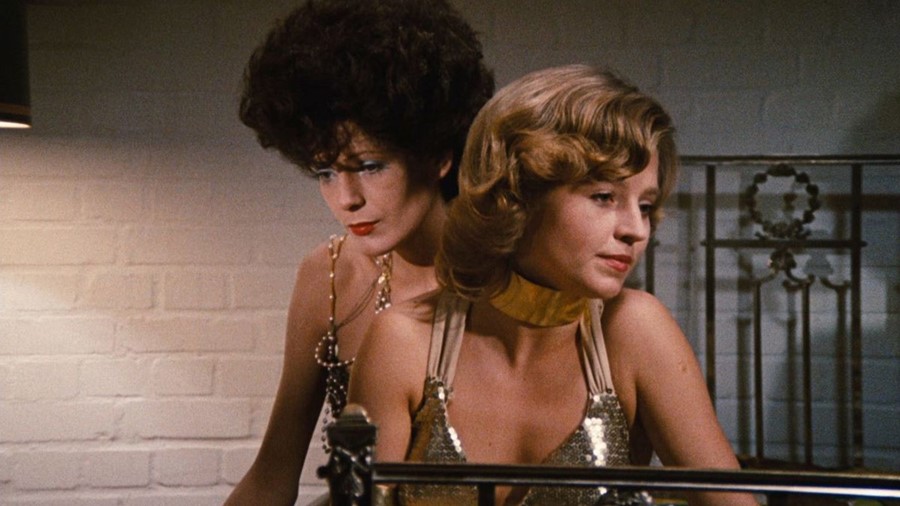
Taking place entirely within the confines of the title characters apartment, The Bitter Tears of Petra Von Kant is an emotional and claustrophobic exploration of the relationship dynamics between two lovers. Fassbinder illustrates the obsessive nature of desire, and the deep level of anguish one is willing to suffer in the name of love.
Petra Von Kant (Margit Carstensen) is a distinguished German fashion designer. She lives a bourgeoisie life spending her days lounging in her luxurious apartment, and ordering her submissive and admiring colleague Marlene (Irm Hermann) around like a slave.
Petra is a proud independent woman, whom having established herself in the fashion industry, has developed an inflated sense of entitlement. Upon meeting Karen (Hanna Schygulla) Petra immediately falls madly in love, and offers her work as a model. Petra is soon indulging all of Karen’s whims in the hopes of winning her affection.
Fassbinder reveals the dangerous vulnerability of falling love, especially when it is unrequited. Petra tries desperately to win Karen’s affection, providing her with a home, with work, and paying for all of her expenses. Yet no matter how much Petra gives, she is met with indifference, hostility, and only sometimes intimacy.
Her inflated sense of self is wounded as she is subjected to degradation and humiliation, which only intensifying her desire for Karen. The Bitter Tears of Petra Von Kant portrays love as weakness, contradicting the notion of love as an invaluable emotion.
5. Blue Valentine (Derek Cianfrance, 2010)

Written and directed by Derek Cianfrance, Blue Valentine tells the story of Dean and Cindy, two long time sweat-hearts whose marriage has begun to deteriorate. Cianfrance depicts romantic love as dynamic and vulnerable to change.
Dean is a high school dropout working for a moving company. While assisting an elderly man in moving into a nursing home, he meets Cindy, who is there visiting her grandma. Cindy is a pre-med college student who still lives at home with her parents. Dean and Cindy begin dating, and very quickly start a family together.
Fast forward 5 years, Dean and Cindy’s marriage has taken a turn for the worse. Cindy is unhappy with Dean’s alcoholism, demands for affection, and lack of ambition. Desperate to preserve the family that that he always wanted, Dean struggles to re-ignite Cindy’s love for him.
Blue Valentine explores the vulnerable nature of romantic love and questions the notion of love as static. Dean becomes complacent, and takes Cindy’s love for granted, unaware that his charming deeds of the past alone are not enough to preserve their relationship. No matter how deeply romantic partners care for and love one another, things can change for the worse. Love must be nurtured; otherwise it can end just as quickly as it began.
4. Amour (Micheal Haneke, 2012)
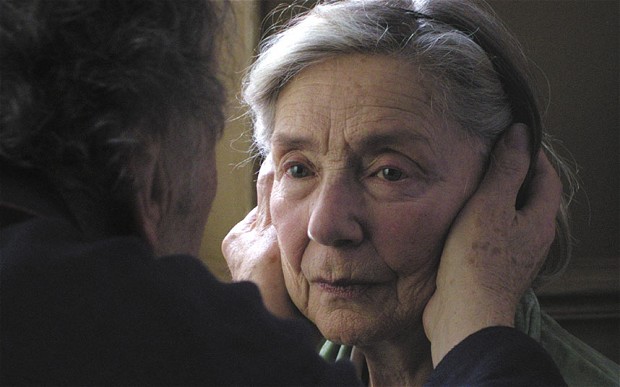
Winner of the 2012 Cannes Palm d’Or and an Academy Award for best foreign language film, Amour depicts the dangers of co-dependence involved with romantic relationships. Michael Haneke reveals peoples vulnerability to suffering when their life is inextricably bound to another’s by love.
Anne (Emmanuelle Riva) and George (Jean-Louise Trintignant) are a happily married couple. In their old age they maintain a deep love and affection for one another. They are both retired piano teachers who share a love for classical music. One day during breakfast, Anne has a stroke.
After undergoing what was supposed to be a low risk procedure, Anne is left paralyzed form her left side, and her condition is expected to degenerate over time. George struggles with the demands of nursing the woman he loves, whose condition has robbed her of her autonomy, as well as her will to live.
Haneke confronts the audience with the inherent vulnerability involved in being in love. The bond of a strong romantic relationship leaves ones happiness at the mercy of the others. George’s life is inextricably bound to Anne’s. His happiness depends on her presence and well-being.
When Anne becomes ill, George is compelled by his love to act as her care taker, further adopting her pain as his own. George is then shattered when Anne expresses her loss of the will to live. George cannot escape his suffering. He cannot take the pain of bearing witness to Anne’s degraded value of life. Neither can he take the pain of living life without Anne by his side.
3. Eyes Wide Shut (Stanley Kubrick, 1999)
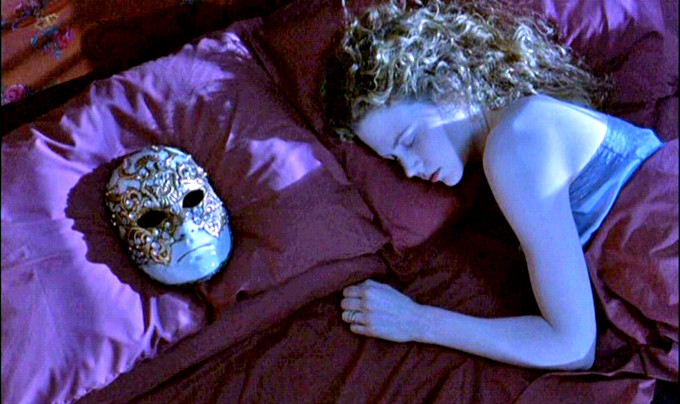
Based on the Novella Dream Story by Austrian writer Arthur Schnitzler, Eyes Wide Shut was Stanley Kubrick’s final work before his untimely death. The film follows Bill Harford on his sexually charged adventure into New York’s underbelly. Eyes Wide Shut warns of the dangers in allowing oneself to become complacent with one’s romantic relationships. Kubrick proposes that romantic love is influenced by primal drives and impulses, as well societal constructs, both of which must be acknowledged and accepted.
Bill (Tom Cruise) and Alice (Nicole Kidman) Harford are a young well to do couple living in New York. While attending lavish party thrown by one of Bills patients, Alice is approached and enticed by another guest. Alice is interested but resists his advances. Meanwhile she notices that Bill is being seduced by two women. The two women invite Bill for on a tryst. After admitting his temptation, Bill politely declines.
The next day, Alice questions Bill’s loyalty, revealing what she saw at the party the night before. After discussing temptation, loyalty, and female vs male desire, Alice admits that she has fantasized about another man before. Bill is confounded. Feeling betrayed he sets out on a journey to arouse and satisfy his desire.
Kubrick challenges the notion of romantic love as unconditional. Bill and Alice’s marriage is thrown into turmoil when Alice reveals that woman, including herself, are subject to the same impulsive desires as men. Alice is disgusted with Bill’s complacent arrogance. His eyes are not open to the realities of love, sex, and society.
Kubrick argues that the flourishing of a romantic relationship depends on a number of conditions, many of which are beyond human control. The first step in nurturing romantic love is to acknowledge its disturbing realities and break free from the blinding influence of ideals.
2. Woman Under the Influence (John Cassavetes, 1974)
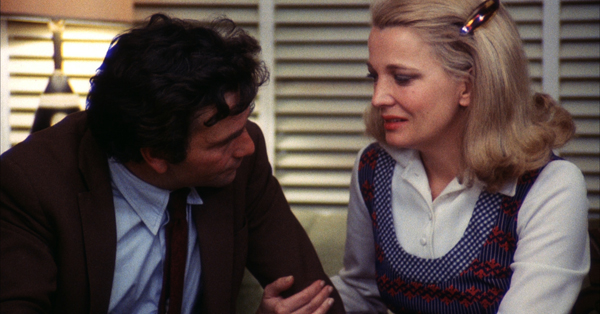
Written and directed by independent film pioneer John Cassavetes, Woman Under the Influence portrays romantic love as messy and exhausting, involving intensely contradicting emotions of desire and repulsion. Cassavetes challenges the notion of love as perfectly romantic and without conflict or pain.
Mabel (Gena Rowlands) is a house wife living in Los Angeles. She loves her husband Nick (Peter Falk) and desperately wants to please him. Nick works long hours in construction and is often on call, making it impossible to spend quality time with his family. Stuck at home with the responsibility of taking care of the kids, Mabel has no time to herself, nor does she have any outlets to express her feelings.
Mabel begins to display progressively disturbing signs of mental illness. Nick reluctantly commits Mabel to a mental institution, fearing that she has become a danger to herself their children. Upon her return, Nick is disappointed to see Mabel’s transformation from a spontaneous and fun, to docile and quiet.
Cassavetes reveals that love is a messy combination of contradictory emotions. Love is so dynamic that one’s emotions regarding romantic partners can drastically change from one minute to the next. We can cherish our partners, then and despise them in an instant.
We can admire our partners for who they are, yet wish that they could be different. Nick adores Mable’s eccentric personality, but he despises her when others convince him that she is sick. At times he loves Mable, yet other times he does not.
1. Scenes from a Marriage – Television Version (Ingmar Bergman, 1973)
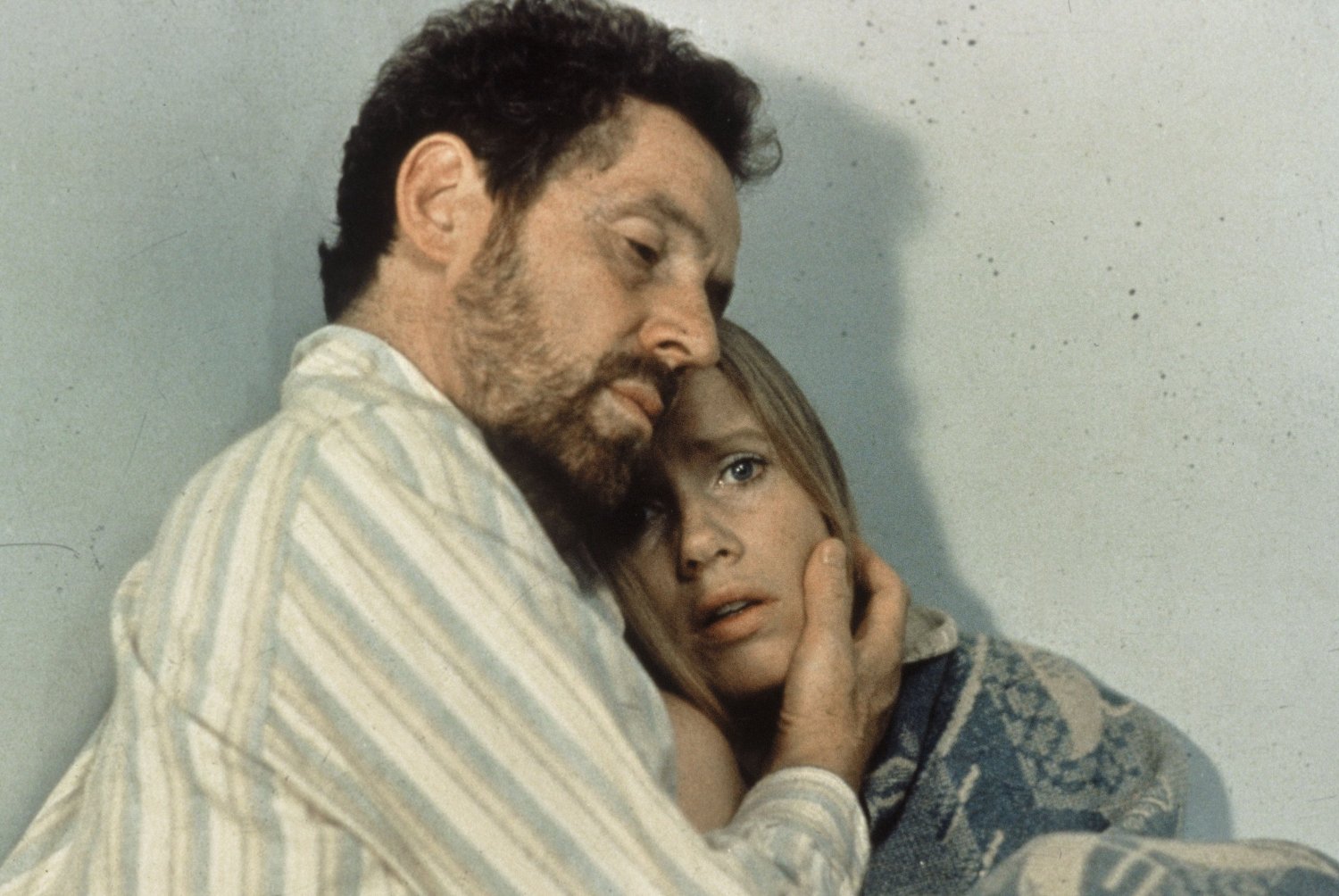
Condemned for allegedly inciting a double in divorce rates amongst Scandinavian audiences, Ingmar Bergman’s masterpiece chronicles the enduring love between Marianne and Johan through turmoil, infidelity, and the dissolution of their marriage. Bergman portrays romantic love as imperfect, full of doubt, and a source of great suffering.
Marianne (Liv Ullman) and Johan (Erland Josephson) agree that after ten years of marriage, they are a truly happy couple. Marianne is a lawyer and Johan is a professor. Together they have three children. The two enjoy moderate success in their respective careers, financial stability, and a composed romantic relationship.
One day, without warning, Johan arrives home early from a business trip to confess that he has fallen in love with another woman. Johan wants an immediate separation without discussion. Marianne and Johan struggle to live life totally independent from one another, constantly finding their way back to each other.
Bergman depicts romantic love as imperfect, painful, yet ultimately enduring. After ten years in a calm and a comfortable relationship, Marianne and Johan begin to question the validity of their claim to be a truly happy couple.
Once Johan embraces his impulse to fulfill his sexual desires, their marriage is thrown into turmoil. In spite of the contempt, the abuse, and the suffering they cause one another, the two cannot destroy their love for each other.
Author Bio: Jonathan holds a B.A. in Philosophy from UCLA, and is currently pursuing a career in Journalism. On his spare time, Jonathan enjoys writing, kickboxing, and creating music.Check out his music on bandcamp: https://szamanka.bandcamp.com/.